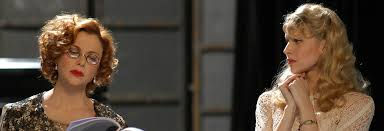A Journey Through Cinema: Discovering the Essence of Being Julia at Budapest Classic Film Marathon
- Rita Di Santo

- Sep 23, 2025
- 3 min read

The Budapest Classic Film Marathon is an annual international festival dedicated to the exhibition of restored classic films, meticulously organized by the National Institute of Hungary. This festival aims to illuminate the invaluable cinematic heritage of both Hungarian and international film. This year, the eighth edition of the festival, opened with a screening of Being Julia, a romantic comedy released in 2004 and directed by the renowned Hungarian filmmaker István Szabó.
Set against the backdrop of the 1930s London theatre scene, the narrative centres on Julia Lambert (Annette Bening), a highly successful and celebrated stage actress. Despite her professional achievements and her marriage to her impresario husband, played by Jeremy Irons, Julia grapples with a profound sense of stagnation and ennui. This internal dissatisfaction is catalysed by a passionate affair with a young American admirer, Tom, depicted by Shaun Evans. However, the seemingly idyllic romance takes an unforeseen turn when Tom's affections shift toward an aspiring actress, whom he exploits to further his own ambitions.
In retaliation, Julia devises a scheme for revenge, showcasing her cleverness and resilience. Bening's performance is nothing short of remarkable, earning her a Golden Globe for Best Actress and an Academy Award nomination, as her portrayal of the aging, charismatic diva is both captivating and deeply convincing. Over the past two decades, the film's themes have only increased in relevance, particularly concerning women's empowerment. The film's aesthetic qualities, including its lighting, vibrant colour palette, and sound design, are exemplary. At the time of its release, Bening's accomplishment was extraordinary, yet the supporting cast, particularly Jeremy Irons as the husband and theatre impresario, also delivered commendable performances.
This film invites contemplation on the evolution of cinema; despite being produced in 2004, it retains a contemporary resonance in both its thematic exploration and visual style. This year's screening took place at the Uranian National Film Theatre, a historic cinema in Budapest established in 1890, known as an early hub for Hungarian film, having hosted screenings since 1917. Initially a popular cinema, it transitioned to UFA Cinema in 1930 Being Julia, set in the 1930s, aligns seamlessly with the theatre's origins, which began as an ornate cabaret and dance hall, adorned with stunning Venetian Gothic and Moorish-inspired architecture, thereby creating an ideal atmosphere for transporting viewers to a bygone era.

Another significant aspect of the film is Szabó's distinctive directorial style. The acclaimed Hungarian filmmaker is celebrated for his ability to capture deeply personal and introspective narratives while exploring the complexities of history, identity, and the human psyche. His films often blend elements of fantasy and imagination, infused with a lightness that contrasts with the serious themes he examines. Szabó is credited with igniting the "new wave" in Hungarian cinema, with his works frequently addressing moral dilemmas and the profound impact of societal pressures on individuals. In Julia's case, she appears to navigate a predetermined trajectory as she ages, yet ultimately, she succeeds in liberating herself, forging her own identity in the process. Szabó employs close-ups and intimate framing to foster a personal connection between the audience and the character, offering a nuanced exploration of their emotional landscapes. His stylistic approach features visually sophisticated cinematography and meticulous attention to period-specific details and colour palettes. While Being Julia is one of his more subdued films, it possesses broad appeal, ultimately focusing on the protagonist's ethical and existential choices, making it a fitting inaugural presentation for this year’s Budapest Film Marathon.




Comments